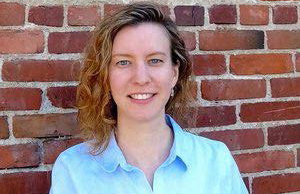Recent Steward Ph.D. K. Decker French Wins the ASP's Trumpler Award

The Astronomical Society of the Pacific recently announced that K. Decker French (Ph.D. in 2017 from U.A. Dept. of Astronomy) has been awarded the 2019 Trumpler Award. It is given to "a recent recipient of the Ph.D. degree in North America whose research is considered unusually important to astronomy."
You can read the A.S.P.'s press release HERE. The Carnegie article is HERE.
While at Arizona, Dr. French worked with Prof. Ann Zabludoff and contributed to a range of astronomical subfields, such as gravitational lensing, galaxy evolution, and the tidal disruption of individual stars by the massive black holes in the centers of galaxies. Her analyses included theoretical simulations, machine learning classifiers, and space- and ground-based imaging and spectroscopy that spanned ultraviolet to radio wavelengths. Dr. French's 2017 Ph.D. dissertation, "New Methods for Tracking Galaxy and Black Hole Evolution using Post-Starburst Galaxies," made important discoveries connecting the global star formation histories of galaxies to their gas content and to their galactic nuclei. She is now a Hubble Post-Doctoral Fellow at the Observatories of the Carnegie Institution of Washington.
Decker joins an impressive list of Stewardites who have won the Trumpler Award: Jennifer Scott (2005), Jill Bechtold (1988), John Hill (1986), and Gary Schmidt (1979). In addition professors and former professors Gurtina Besla (2013, Harvard), Jim Liebert (1980, Berkeley), and the above-mentioned Jill Bechtold have been so honored.
Congratulations, Decker, from all of us in the Astronomy Dept. and Steward Observatory.

For Public
Public events include our Monday Night Lecture Series, world-reknowned Astronomy Camp and Mt Lemmon Sky Center.

For Students
A good place to start if you want to become an undergrad major or grad student, or need to find our schedule of classes.

For Scientists
Find telescopes and instruments, telescope time applications, staff and mountain contacts, and faculty and staff scientific interests.




